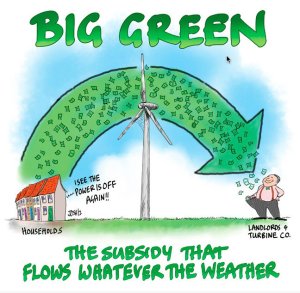
Looking past the smoke and mirrors game, we find the true financial pain being inflicted on UK electricity customers in the name of climate ideology aka the Climate Change Act.
The total annual renewables subsidy impact on UK household cost of living is £9 billion — which comes to £340 per year per household, says The Global Warming Policy Forum (GWPF).
The low and much-publicised offshore wind bids for Feed-in Tariffs with Contracts for Difference (FiTs CfDs) continue to confuse many analysts, even those from whom one might expect clear-eyed caution.
A writer for CapX (“What is the point of Corbyn’s nationalised wind farms?”), to select an example almost at random, quite correctly takes issue with the Labour Party’s reckless plans for major public investment in further offshore wind, but does so on the mistaken ground that “offshore wind is a big success story […] delivering ever more clean energy, at ever lower prices, for a fraction of the price of Labour’s plan”.
However, and as a matter of fact, none of the low-bidding wind farms have actually been built, and the 8.5 GW of operational offshore wind capacity which is “delivering” is without exception very heavily subsidised.
Indeed, the most recently commissioned offshore wind farm, the giant 588 MW Beatrice of the North East coast of Scotland, which only became fully operational in the summer of 2019, has a CfD strike price of £140/MWh now worth £158.73/MWh, roughly three times the wholesale price, and indeed about three times the almost certainly unrealistic strike prices bid in the most recent CfD auctions.
It is obviously premature to say that the observed fall in CfD prices bid is a “success story”.
The CfD contracts are very far from firmly binding, and the penalty for abrogration is trivial. It seems likely, bordering on certain, that they are a sly and low risk publicity gambit, intended to secure a market position, and inhibit competition, in the hope of obtaining a better price by whatever means at a later date.
And of course the cost of electricity from existing offshore wind power has most certainly not fallen; it continues to be very high, like all the other renewable generators in the UK fleet.
Perhaps it is worth reminding ourselves just how much that subsidy currently amounts to and how much it is costing British households.
Continued here.






Reblogged this on Climate- Science.press.
This is no surprise to those of us who have been following the story. With such huge subsidies, no wonder the government (or the civil servants) try and keep the numbers hidden from the consumers. And the greenblob, with its propaganda and lies, tries to tell us that fossil fuels are massively subsidised and renewables are getting cheaper and more competitive.
Don’t think of it as a cost; think of it as tithing.
The penalty for abrogation of round 3 CFDs before start-up is being wallied for 24 months from making further bids. Since the bids are made by special purpose vehicles that is ineffective unless they look through to the corporate owners and JV partners. Besides, when panic sets in and they need to build CCGT in a hurry all that goes out the window. The penalty for abrogation later is supposedly a calculation of the forward cashout liability under the CFD. Go whistle for a bankrupt SPV. Or see them walk ahead of a major run up in prices, where the cashout cost would look trivial compared with the added profit from high market prices.
The costs identified by Dr John Constable exclude most of the consequential costs of allowing renewables onto the grid. Only capacity market payments are identified, with the very substantial investments in grid capacity to deliver power from distant wind farms and disperse solar surpluses from the SW in summer, and additional grid stabilisation spending, reduced efficiency of operation of CCGT, constraint payments etc., completely ignored. Also ignored is the economic impact of uncompetitive energy prices that leave us importing things we used to make.
Time too that we calculated the average cost including subsidies for each technology on a per kWh basis, so ordinary people can relate to the subsidies compared with their own bills.
GWPF: [Official] ‘figures were last published in 2014 (Estimated Impacts) and discontinued, many of us suspect, because they were so embarrassing.’
[…] https://tallbloke.wordpress.com/2019/10/14/british-renewables-subsidies-cost-households-340-per-year… […]
Maybe the subsidies should go into an escrow account to only be used for the decommissioning of the wind farms rather than the taxpayers being charged extra for that.
British are paying more for renewables than US paying for space program.
Or British could have a space program instead of their renewables.
But British’s poor are paying most of cost of the renewables and US’s poor are paying small part of
US space program.
Why does the British government make the poor mostly pay for something they don’t want?
Basic humour alert…
GREEN POVERTY: THREE MILLION BRITISH HOUSEHOLDS ALREADY IN ENERGY DEBT AHEAD OF WINTER
Date: 16/10/19 Energy Live News
These fuel-poor households collectively owe nearly £417 million to their suppliers, with the year’s coldest weather soon to arrive.
. . .
Around 12% of people are currently in debt to their energy supplier, with customers owing an average of £124 each – this is likely to worsen as energy demand ramps up to keep homes warm during winter.
https://www.thegwpf.com/green-poverty-three-million-british-households-already-in-energy-debt-ahead-of-winter/
“Around 12% of people are currently in debt to their energy supplier, with customers owing an average of £124 each – this is likely to worsen as energy demand ramps up to keep homes warm during winter.”
And how much do pay if late paying their bills- there is all kinds problems and costs other than the extreme consequent of dying directly from these oppressive policies.